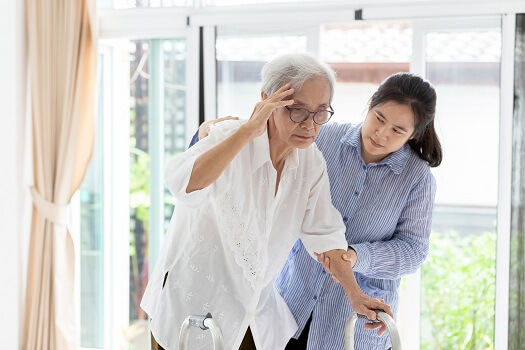Seniors can experience balance issues as a result of preexisting medical conditions, side effects from prescription medications, and even psychological disorders. While balance issues in seniors aren’t unusual, they need to be addressed because they can lead to accidents and injuries. Here are several balance issues older adults commonly experience and tips on how you can reduce your aging loved one’s risk for accidents.
1. Degenerative Spine Disorders
Many seniors are affected by degenerative spine disorders that make ambulation painful. Sometimes pain is so severe that older adults develop balance issues. One of the most common degenerative spinal disorders associated with aging is osteoporosis. While osteoporosis is more common in postmenopausal women, it can also affect men.
If your loved one develops a degenerative condition of the spine, especially if he or she is experiencing balance issues, make an appointment with a physician. The doctor can order a bone density test to determine if the bones are thinning as a result of low estrogen levels, the aging process, or another cause. Once degenerative conditions of the spine have been recognized and treated, balance issues may resolve.
Seniors can face a variety of challenges as they age, many of which can be mitigated with the help of professional in-home caregivers who provide high-quality home care. Trust Embrace In-Home Care to help your elderly loved one age in place safely and comfortably.
2. Diuretics
Prescription medications known as diuretics are used to treat high blood pressure and edema, or fluid retention in the tissues. Diuretics are also known as water pills because they promote frequent urination, which can cause dehydration. When dehydration becomes severe, dizziness, lightheadedness, confusion, and loss of balance can occur.
If your loved one takes diuretics, make sure he or she drinks plenty of water throughout the day to restore lost fluids. If side effects persist despite fluid replacement with water, see the physician. Diuretics can lead to electrolyte imbalances, especially those associated with potassium and sodium. Once electrolytes have been restored to normal levels, side effects such as dizziness and balance issues should decrease.
3. Dementia
Dementia and cognitive deficits can also cause balance loss because these conditions can alter the perception of depth, space, length, and height. While balance issues related to dementia and cognitive decline may be difficult to treat, there are some measures you can take to prevent your loved one from falling. Always make sure your loved one wears properly fitting shoes and prescription glasses if necessary. Also, ensure the floors are free of obstacles and that your parent’s pants or pajamas aren’t too long so he or she doesn’t trip.
Hiring a professional caregiver is a good way to reduce your loved one’s risk of falls and injuries. Aging adults who require assistance with the tasks of daily living can benefit from reliable senior home care. Green Valley, AZ, families trust Embrace In-Home Care to provide the high-quality care their elderly loved ones need and deserve. Our caregivers are trained to help seniors prevent and manage serious illnesses and encourage them to make healthier decisions as they age.
4. Glaucoma
Glaucoma causes fluid buildup in the back of the eye and elevated intraocular pressure, which can lead to vision loss, balance disorders, and, in some cases, total blindness. While glaucoma can cause central vision impairment, it’s most notably responsible for issues with peripheral vision. Your loved one’s eye doctor can prescribe drops that lower intraocular pressure so symptoms subside, which may clear cloudy vision and reduce the risk of balance issues.
5. Side Effects of Hip Replacement Surgery
Older adults are at risk for arthritis, dislocation, and fractures due to falls. If your loved one sustains a hip fracture, replacement surgery may be necessary. While hip replacement surgery resolves pain, your parent may need extensive physical therapy to learn how to properly walk with the prosthetic hip so proper balance can be restored.
Hip surgery can lead to limited mobility, an unsteady gait, and balance deficits. If your loved one undergoes hip replacement surgery, make sure he or she isn’t left alone at home until recovery is complete.
Living with serious health conditions can make it challenging for seniors to age in place. However, they can maintain a higher quality of life with the help of professional live-in care. Green Valley seniors can benefit from assistance with meal prep, bathing, transportation to the doctor’s office, medication reminders, and much more. Trust your loved one’s care to the professionals at Embrace In-Home Care. To create a customized home care plan for your loved one, call (520) 625-2050 today.
